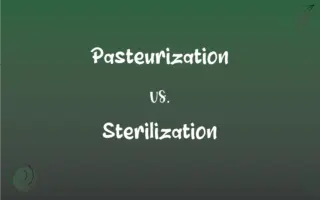Hydrolysis vs. Hydration: What's the Difference?
Edited by Janet White || By Harlon Moss || Updated on October 21, 2023
Hydrolysis is a chemical process where molecules are split by water. Hydration is the process of adding or absorbing water to or by a substance.

Key Differences
Hydrolysis is a specific chemical reaction where water is used to break down a molecule into smaller components. In contrast, hydration refers to the general process where water molecules become associated or attached to another substance without necessarily breaking it down.
Hydrolysis often involves breaking strong chemical bonds, leading to the formation of two or more new products. Hydration, however, often involves weak interactions, such as hydrogen bonding, between water and the substance it is hydrating.
A classic example of hydrolysis is the breakdown of complex carbohydrates, like starch, into simpler sugars using water. In the realm of hydration, when salt dissolves in water, the salt ions become hydrated as they are surrounded by water molecules.
Hydrolysis reactions are crucial in numerous biological processes, including digestion and cellular functions. On the other side, hydration plays a significant role in maintaining the structural integrity of cells and the balance of fluids in organisms.
It's essential to understand that while both hydrolysis and hydration involve water, their implications and outcomes in the context of chemistry and biology are distinct and serve different purposes.
ADVERTISEMENT
Comparison Chart
Definition
Chemical breakdown by water.
Process of adding/absorbing water.
Bonds Involved
Breaks strong chemical bonds.
Involves weak interactions or bonds.
Outcome
Produces two or more new products.
Substance becomes associated with water.
Biological Relevance
Crucial in digestion and cellular functions.
Maintains cellular structure and fluid balance.
Nature
Specific type of chemical reaction.
General process involving water.
ADVERTISEMENT
Hydrolysis and Hydration Definitions
Hydrolysis
A chemical process where water breaks down molecules.
The hydrolysis of starch produces glucose units.
Hydration
The process of adding water to a substance.
The hydration of anhydrous copper sulfate turns it blue.
Hydrolysis
The splitting of molecules using water.
The hydrolysis of proteins yields amino acids.
Hydration
Associating or combining with water molecules.
The hydration shell surrounds dissolved ions in a solution.
Hydrolysis
A water-based degradation of substances.
Hydrolysis can break down complex organic compounds into simpler ones.
Hydration
The state of having water molecules attached.
Cement undergoes hydration to form concrete.
Hydrolysis
The use of water to cleave chemical bonds.
Ester bonds undergo hydrolysis to form acids and alcohols.
Hydration
Absorbing water into a substance or structure.
Clay minerals expand upon hydration.
Hydrolysis
The reaction of water with another chemical compound.
The hydrolysis of ATP releases energy in cells.
Hydration
The act or process of imbuing with water.
Hydration is essential for maintaining skin elasticity.
Hydrolysis
The reaction of water with another chemical compound to form two or more products, involving ionization of the water molecule and usually splitting the other compound. Examples include the catalytic conversion of starch to glucose, saponification, and the formation of acids or bases from dissolved ions.
Hydration
A solid compound containing water molecules combined in a definite ratio as an integral part of the crystal. Often used in combination
Pentahydrate.
Hydrolysis
(chemistry) A chemical process of decomposition involving the splitting of a bond and the addition of the hydrogen cation and the hydroxide anion of water.
Hydrolysis
A chemical process causing the splitting of a chemical bond by the addition of the elements of water. Where the bond which is split is not part of a ring structure, this process causes formation of two compounds from one compound plus water, as in the hydrolysis of the ester bonds of fats during saponification.
Hydrolysis
A chemical reaction in which water reacts with a compound to produce other compounds; involves the splitting of a bond and the addition of the hydrogen cation and the hydroxide anion from the water
FAQs
Can hydrolysis occur in our bodies?
Yes, hydrolysis plays a crucial role in digestion and cellular processes.
What does hydration mean?
Hydration refers to the process of adding or absorbing water to or by a substance.
Is hydrolysis a type of chemical reaction?
Yes, hydrolysis is a specific chemical reaction involving water to split molecules.
Is an enzyme needed for hydrolysis?
In biological systems, enzymes often catalyze hydrolysis reactions.
What's an example of hydrolysis in daily life?
The digestion of food involves hydrolysis reactions to break down larger molecules.
Can hydration occur in non-living systems?
Yes, like the hydration of cement in concrete formation.
Can hydrolysis be reversed?
Yes, through dehydration synthesis or condensation reactions.
Is hydration vital for all living organisms?
Yes, hydration is crucial for cellular activities and overall survival in all organisms.
What does hydrolysis entail?
Hydrolysis involves the chemical breakdown of a molecule using water.
Is hydration important for the human body?
Yes, hydration is vital for cellular function and overall fluid balance in the body.
Does hydrolysis always produce two products?
Not always, hydrolysis can produce two or more products depending on the molecule being split.
How does hydration affect athletes?
Proper hydration is essential for muscle function and recovery in athletes.
Why is skin hydration important?
Skin hydration maintains elasticity and prevents dryness and flaking.
Does hydration have a temperature effect?
Yes, temperature can influence the rate and extent of hydration in various systems.
Is hydration always a chemical reaction?
No, hydration can be a physical process, like water absorption, or a chemical association without bond breaking.
Does hydration change the state of a substance?
Sometimes, for example, anhydrous substances can become hydrated solids.
Is drinking water the only form of hydration for the body?
No, hydration can also come from other beverages and foods with high water content.
Can hydrolysis occur without enzymes in non-biological systems?
Yes, hydrolysis can be induced by other catalysts or conditions outside biological systems.
Can hydrolysis affect the pH of a solution?
Yes, hydrolysis of certain compounds can either release or consume H+ ions, affecting pH.
Is hydrolysis energy releasing or consuming?
It depends on the specific reaction, but many hydrolysis reactions, like ATP hydrolysis, release energy.
About Author
Written by
Harlon MossHarlon is a seasoned quality moderator and accomplished content writer for Difference Wiki. An alumnus of the prestigious University of California, he earned his degree in Computer Science. Leveraging his academic background, Harlon brings a meticulous and informed perspective to his work, ensuring content accuracy and excellence.
Edited by
Janet WhiteJanet White has been an esteemed writer and blogger for Difference Wiki. Holding a Master's degree in Science and Medical Journalism from the prestigious Boston University, she has consistently demonstrated her expertise and passion for her field. When she's not immersed in her work, Janet relishes her time exercising, delving into a good book, and cherishing moments with friends and family.







































































